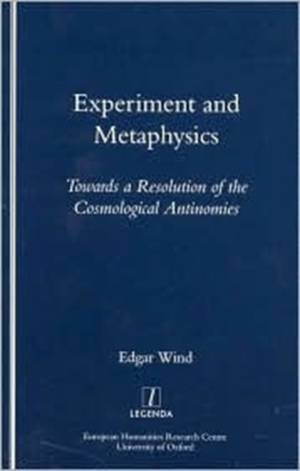
- Afhalen na 1 uur in een winkel met voorraad
- Gratis thuislevering in België vanaf € 30
- Ruim aanbod met 7 miljoen producten
- Afhalen na 1 uur in een winkel met voorraad
- Gratis thuislevering in België vanaf € 30
- Ruim aanbod met 7 miljoen producten
Zoeken
Experiment and Metaphysics
Towards a Resolution of the Cosmological Antinomies
Edgar Wind
Paperback | Engels
€ 89,45
+ 178 punten
Omschrijving
Edgar Wind was one of the most distinguished art historians and philosophers of the twentieth century. He made crucial contributions to debates on aesthetics and on the interdisciplinary nature of cultural history involving such other leading figures as Ernst Cassirer and Erwin Panofsky. It is not always realised, however, that his early thinking was moulded by a concern with the German philosophical tradition, culminating in the analysis of the meaning and function of scientific experimentation and proof. This first edition in English of Edgar Wind's important work Das Experiment und die Metaphysik: Zur Auflosung der kosmologischen Antinomien (1934) also carries a new introduction by Matthew Rampley, placing Wind's philosophical thinking in context. The work is being published to coincide with the opening in 2000 of the Sackler Library at Oxford, which will include a Wind Reading Room.
Specificaties
Betrokkenen
- Auteur(s):
- Uitgeverij:
Inhoud
- Aantal bladzijden:
- 176
- Taal:
- Engels
Eigenschappen
- Productcode (EAN):
- 9781900755290
- Verschijningsdatum:
- 1/12/2001
- Uitvoering:
- Paperback
- Formaat:
- Trade paperback (VS)
- Afmetingen:
- 137 mm x 213 mm
- Gewicht:
- 258 g

Alleen bij Standaard Boekhandel
+ 178 punten op je klantenkaart van Standaard Boekhandel
Beoordelingen
We publiceren alleen reviews die voldoen aan de voorwaarden voor reviews. Bekijk onze voorwaarden voor reviews.











